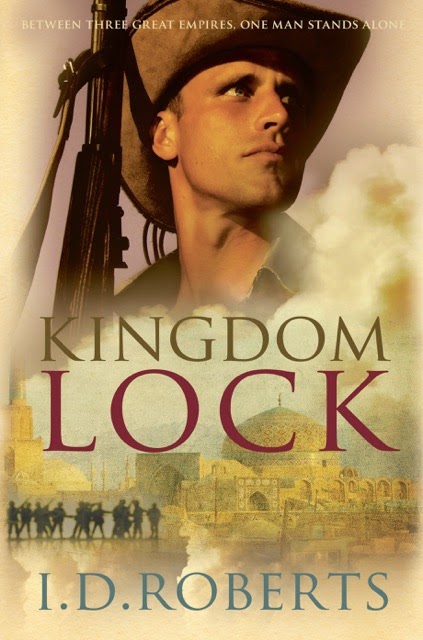ID Roberts has been a wonderful supporter of the HNSA conference.
Even though he is on the other side of the world, he donated to the Pozible
campaign and then offered the prize of one free day ticket to another lucky attendee. To acknowledge his support, we're publishing a
great post where he explores how historical research can be blended seamlessly
to produce historical fiction.
One of the questions I find myself being asked the most by readers, when I meet them, is about research. How much do I do? How did I find a particular thing out? And did it take me a long time?
Visit I.D. Roberts
at his website or tweet
@kingdomlock
Featured Book
The ground in front of Lock kicked up a spray of snow. Moments later a gunshot rang out, echoing loudly off the mountainside. Lock felt Amy tense as he staggered and turned. On the furthest ridge behind them, no more than a mile away, there were now three men on horseback. 'Bugger!' Lock turned away and laboured on. He tried to think only of their escape and not the impact he would feel when the expected bullet pierced his body ending his mission. Not long now, a voice in his head whispered, it won't take long for their pursuers to cover the gap between them on horseback. Hide! We need somewhere to hide, his subconscious screamed. But he could see nothing, only a barren, harsh, unforgiving landscape.
And please take a look at our FREE BOOK OFFERS!
The first 30 ticketholders to purchase a ‘Standard’ Whole Conference Ticket will receive a free copy of either The Lace Balcony by Johanna Nicholls, The King’s Shadow by Barbara Gaskell Denvil or The Island House by Posie Graeme-Evans.
All ticket holders will
receive a Momentum ebook bundle in celebration of Felicity Pulman’s
launch of Unholy Murder.
The first 50 fully paid ticket holders will receive a copy of Sherryl Clark’s new book Do You Dare – Jimmy’s War in celebration of her launch.
I.D. Roberts was born in Ivanhoe near Melbourne, Australia
in 1970 and moved to England when he was three. From a young age he developed
an obsession with war comics, movies, Tintin and James Bond.
At various stages in his life he has worked as a filmmaker,
an industrial temp, a cinema box-office cashier, a runner, a caretaker, a
football correspondent, a police line-up volunteer, a cricket commentator, a
soundtrack reviewer, and a sub-editor. For the past decade he has been the film
writer for the TV Times magazine. In 2012 he was signed by a literary agent.
He holds a BA in Film from the University of Westminster and
an MA in Creative Writing from Bath Spa University.
His debut novel, KINGDOM LOCK, an action-adventure set
during the First World War, was published in May 2014 by Allison & Busby.
The second Kingdom Lock adventure is done, and he recently
completed an adaptation of his grandmother's memoirs. It tells of her time as a
trainee nurse during the Blitz, and is due to be published by Little Brown
(Sphere) in August 2015.
He lives in rural Somerset with his wife Di and their dog,
Steed.
In search of something old that’s
new
One of the questions I find myself being asked the most by readers, when I meet them, is about research. How much do I do? How did I find a particular thing out? And did it take me a long time?
And
it’s not just the
readers, either, who ask those questions. My fellow writers and I often talk
and discuss the merits and disadvantages of research, of how much is too much,
of getting bogged down in fascinating details, and of actually forgetting to
get on with the actual writing of our stories. But
the one thing that we all agree on, is that research can be pretty addictive,
particularly when you have uncovered, or been shown or told about, some new
piece of fact related to your chosen era.
So,
just how much is too much when it comes to research?
If
the truth be told, you can keep working on something over and over, always
improving, always tinkering, always adding something else to enhance the whole.
There is so much information out there nowadays and there are always more
books, more essays, more photos, letters, memoirs, maps, films to study. And
let’s not forget the reference libraries
to visit, the historical sites to discover, the cities to travel around, the
battlefields to walk, and the people to read about and to talk to. Research
really never ends. It is an integral part to all writing, and, I would say, the
life blood of historical fiction in particular.
But
certain
authors will use their research in different ways.
For example, in Historical Fiction, a literary author may go
into huge, intricate detail about, say, a tablecloth. Whereas, for a commercial
writer like myself, that kind of detail would be far too intricate and
distracting, and would best be mentioned in a line, if at all. However, but
both types of author could easily embark on the same amount of research. For
authenticity, I may want to check that the tablecloth was made of cotton, was
white, and decorated with colour, hand-stitched wild flowers. Whereas the
literary author may wish to delve into the history of the tablecloth itself,
writing about its weave, its construction, how the cotton was harvested in the
first place, how it was bleached or how the seamstress lost her eyesight while
sewing on the intricate flowers. Going off on tangents for page after page
after page.
Both are just as valid, they are just two totally different
styles of storytelling. And both equally need research of some level.
My own research for the Kingdom Lock stories is still ongoing. And I don’t
think it will ever really end. It’s amazing how I keep uncovering new and interesting things about
the period: 1914-18; the area I set my stories in: Mesopotamia and Persia; and
some of the historical characters involved.
I think, what with the current interest in the First World War,
more and more documents are being unveiled all the time, and more and more
information is being revealed about certain situations and people during that
rich period of history. I peruse old diaries, military reports, maps and
photographs, as well as hunting out new and fascinating books (both recent and
old) related to the war. More often than not there is some little gem,
somewhere inside them, that I store away for use in a later story. And it’s
amazing how much films and fiction produced both during the war and since can
help, too. I value those as highly as I do history books.
An example of a recent piece of research I had to undertake for
my second Lock adventure, For Kingdom and Country, was trying to discover the type of smart evening wear officers
would dress in whilst dining out in a hot climate. I knew that they couldn’t
possibly wear the familiar short red mess jackets, far too stifling, but try as
I might I just couldn’t find anything out. Then I happened upon a great
Australian website run by a bloke who went into intricate details about
military uniforms of all eras. I emailed him with my problem and a mere few
days later not only did I get a detailed reply, but it was also illustrated
with various colour drawings of hot weather mess attire (white jackets, in case
you wanted to know).
Of course, I could have written the scene in such a way that I
didn’t have to mention the exact type of uniform worn, but I wanted the section
of my story, as I do with all my writing, to feel authentic. Yes, white dinner
jackets are not integral to the tale, and a reader may not even register the
fact, but I do and I feel it is these little details that give Historical
Fiction, and my work, believability.
If a writer can decorate their story with intricate details
based on fact, then it helps to make the world they’ve created and set their
story in authentic and real. After all, Historical Fiction is time travel for a
reader. It is a way of exploring new worlds, old worlds really, and of delving
into the past and living there for some 300 to 400 pages or so.
Research goes on
and you can never win, you can never do enough. For an author, the trick is
knowing when to stop; it is knowing when to put down the history books and the
diaries and the memoirs , it is knowing when to pick up the pen
The ground in front of Lock kicked up a spray of snow. Moments later a gunshot rang out, echoing loudly off the mountainside. Lock felt Amy tense as he staggered and turned. On the furthest ridge behind them, no more than a mile away, there were now three men on horseback. 'Bugger!' Lock turned away and laboured on. He tried to think only of their escape and not the impact he would feel when the expected bullet pierced his body ending his mission. Not long now, a voice in his head whispered, it won't take long for their pursuers to cover the gap between them on horseback. Hide! We need somewhere to hide, his subconscious screamed. But he could see nothing, only a barren, harsh, unforgiving landscape.
For more information on all our panels, please visit our site for program details. And
you can buy your tickets here.
You can also sign
up to the mailing list to
be the first to keep up to date with breaking news on the HNSA conference in
2015.
Please consider visiting us on Twitter and Facebook to help us spread the word!
Please consider visiting us on Twitter and Facebook to help us spread the word!
And please take a look at our FREE BOOK OFFERS!
The first 30 ticketholders to purchase a ‘Standard’ Whole Conference Ticket will receive a free copy of either The Lace Balcony by Johanna Nicholls, The King’s Shadow by Barbara Gaskell Denvil or The Island House by Posie Graeme-Evans.
The first 50 fully paid ticket holders will receive a copy of Sherryl Clark’s new book Do You Dare – Jimmy’s War in celebration of her launch.



No comments:
Post a Comment
Note: Only a member of this blog may post a comment.